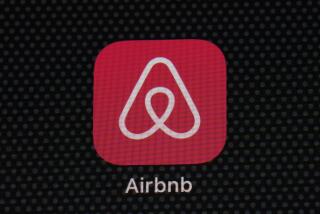Boosting Its Profit Mileage
- Share via
Car rental companies are lifting prices--and keeping them higher--for the first time in years and, though the price hikes are modest, they’re helping to drive the $16-billion industry to sizable profit gains.
Consumers enjoyed a decade of little or no price inflation at car rental counters because the companies, many of them then owned by the Big Three auto makers who were determined to maintain market share at any cost, routinely kept prices low.
But in the last year, most of the major agencies have changed hands or sold their stock to the public, and their new owners are trying mightily to grow their earnings--and provide a healthy return for their stockholders--with the help of higher prices.
“It’s a completely different approach to running the companies,” said Joseph Cappy, chief executive of Dollar Thrifty Automotive Group Inc., a former Chrysler Corp. unit that owns the Dollar and Thrifty agencies and went public in December. “You’re running them to make a profit now.”
Average car rental prices are expected to climb 3% to 5% this year after rising roughly 5% in 1997, estimated Jon LeSage, executive editor of Auto Rental News, a trade publication in Torrance. Others said prices might climb as high as 8% this year.
The higher prices appear to be sticking because consumer travel--and thus rental demand--remains very strong.
It’s hard to further quantify the increases because rental fees vary widely from city to city and from airport locations to urban outlets. Also, big agencies such as Hertz Corp. and Avis Rent a Car Inc. do much of their business with corporate travel departments whose contracts are renegotiated only every year or two.
If travelers haven’t much noticed the higher prices--”we have not been hearing complaints of any kind,” Cappy said--it’s probably because rental costs remain low when adjusted for inflation. Rental executives like to point out that renting a $20,000 car for a day is still cheaper than buying a nice dinner for two or renting a tuxedo.
Even so, the latest price hikes “are very significant for the industry” and mean 1998 “will be a healthy year for the car rental industry,” LeSage said.
The latest evidence came Wednesday, when Avis said its first-quarter profit jumped 30% from a year earlier, in good part because of “continued positive pricing trends,” Avis Chairman R. Craig Hoenshell said.
Avis formerly was a wholly owned unit of Cendant Corp. that sold a big chunk of its stock to the public last September. The profit gain is on a pro-forma basis, that is, as though Avis’ public offering and certain other transactions had occurred a year earlier.
Earlier this month, Hertz--a former wholly owned Ford Motor Co. subsidiary that is now publicly traded--posted an 80% surge in first-quarter profit. In turn, Hertz’ stock price has soared 70% over the last 12 months, compared with the 45% gain of the benchmark Standard & Poor’s 500 Index.
But Wall Street remains concerned that the rental firms might return to widespread price-cutting, especially if the economy softens and consumers’ demand for rented cars starts dropping.
“Right now, decisions are being made in the best interests of the rental companies and their stockholders, but there is a long way to go,” said Neil Abrams, an industry consultant in Purchase, N.Y. “There are old habits that still need to be worked on.”
Indeed, investors’ fears were evident in February when Hertz announced a temporary sale. The stocks of Hertz, Avis and others plunged amid speculation that a new price war was breaking out, but the stocks later recovered when it was clear that Hertz’s promotion was for a limited time.
The agencies also have incentive to keep pushing prices higher because, despite the price hikes to date, they still aren’t earning bushels of profits. Even at their improved levels in the first quarter, Hertz and Avis earned a modest 4 cents and 1.5 cents per dollar of sales, respectively.
Regardless, their improved profits reflect much more than higher prices.
For many years, most major agencies were owned by Ford, General Motors Corp. and Chrysler, and so their job was primarily to buy lots of cars and help keep the manufacturers’ plants busy. That meant market share, not profits, was paramount.
Their earnings picture got even worse in the mid-1990s, when the auto makers withdrew subsidies they’d provided the rental agencies for buying the car makers’ excess production. Instantly, the car renters’ costs skyrocketed--vehicle costs account for up to half of an agency’s total expenses--yet prices stayed flat, squeezing profits.
All that changed with the new ownership. Now freed from the auto makers, the rental firms are pulling back on their fleet purchases to more closely match their supply of cars with renters’ demand.
And that change will be crucial when the economy slows, said Dollar Thrifty’s Cappy. “We can immediately cut our fleet size” to lower costs, he said. “If the business isn’t there, you cut back.”
Fueling Up
Most major car rental agencies, once owned by auto makers, are now publicly traded and they’re raising rental prices in an effort to bolster profits and stockholders’ returns. Daily closes on the New York Stock Exchange since January:
Avis
Thursday: $26.88
*
Budget
Thursday: $35.63
*
Dollar Thrifty
Thursday: $20.38
*
Hertz
Thursday: $46.94
Source: TradeLine
More to Read
Inside the business of entertainment
The Wide Shot brings you news, analysis and insights on everything from streaming wars to production — and what it all means for the future.
You may occasionally receive promotional content from the Los Angeles Times.











